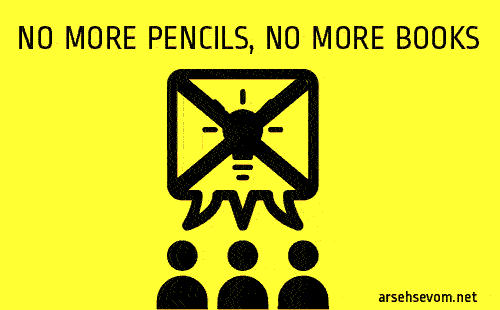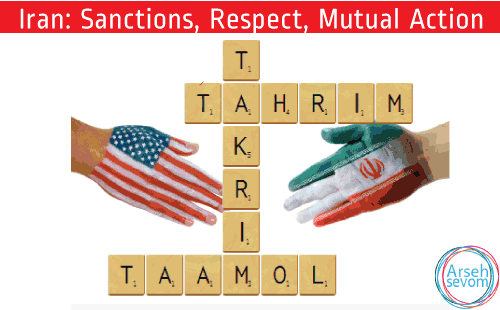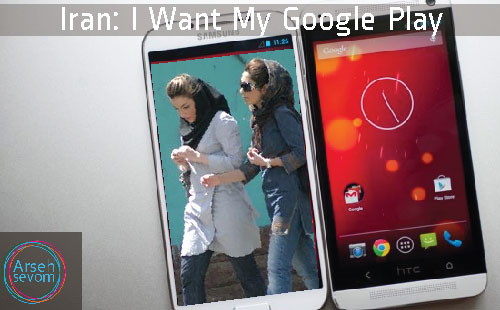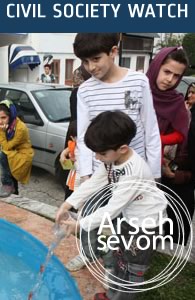
National Internet Hoax? Pay Deflates, Prices Inflate, Goldfish Released
April 17, 2012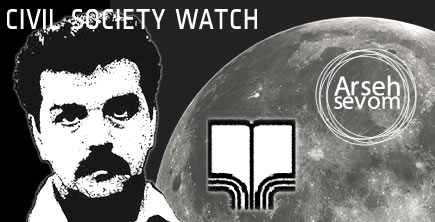
Workers Suffer, Pepsi on the Moon, Cinema Slammed, Families Seek Justice, Prisoners Endangered
June 11, 2012Arseh Sevom — Claims that Iran will launch a “national internet” at the end of August, cutting off access to Google, Hotmail, and other external services, were denied by communications minister Reza Taghipour. He issued a statement denying plans to cut access to the internet calling the whole thing a “13th of Farvardin prank” [the 13th of Farvadin corresponds to April 1] accusing “the propaganda wing of the West” of spreading false rumors.
Non Denial-Denial
Despite Taghipour’s non-denial denial, there was nothing surprising in the comments attributed to him. State efforts to control the internet and social networking are well documented and go back to 2001 when the government took control of access points. In an article on Fars News published six years ago on July 23, 2006, then minister of communications Mohammad Soleimani is quoted discussing the national internet, claiming that it would benefit domestic users by reducing costs. He also defended censorship (filtering), stating, “Fundamentally filtering is the right measure…The task of filtering is to eliminate inaccurate information and libel.” Soleimani added, “Using filtering tools, people must be provided with correct and beneficial information. The filtering system is a good system, and we have to acquire its science in our country.”
When asked to comment on the ministry’s denial of an end of summer deadline for implementing a national internet, blogger and computer engineer Arash Abadpour, who has been following this story carefully, told Arseh Sevom, “There is no shortage of people willing to inform the world that something or other is a hoax when it comes to Iran, just as there is no shortage of politicians and officials who claim they were misquoted or taken out of context. The national internet is moving forward. Whether it succeeds or not is still an open question.”
Summary of the State of the National Internet
Arseh Sevom has been following the story of Iran’s efforts to build a so-called “clean, halal network” for over one year. (More information can be found in RSF’s Enemies of the Internet Report and in a Global Voices summary.) What follows is a brief summary of the state of the project:
- Construction of a national internet continues. If anything, the regime is even more dedicated to its implementation given recent proclamations from the Supreme Leader;
- It seems clear that Iran has been getting outside support for the development of its national internet;
- Many inside Iran have begun receiving text messages urging them to register for IranMail (http://mail.iran.ir/register/?module=new). Registration requires the use of a valid national identification number;
- Bloggers and owners of websites are being forced to register with a national system;
- NGOs are now being asked to register with a national network;
- Internet bandwidth is controlled by the state;
- 5 million sites are blocked;
- 29 netizens have been arrested and some are facing the death penalty;
- Justifications for Iran’s construction of a national internet are the need for “national security,” echoing the justifications for surveillance given by democratic governments.
Supreme Council of Cyberspace
In March of 2012, the newly appointed Supreme Council of Cyberspace met for the first time. The group was formed in order to ensure that decision-making related to implementation of the national internet was done at the highest level of government.
In an interview reported with medianews.ir, a representative of the council, Hamid Shahriari, spoke of some of the problems faced by the national internet project. He discussed “overlapping laws and regulations…the lack of a strong will within the government, and lack of clarity of who had the last word…” In the course of the interview he claims that the creation of a Supreme Council on Cyberspace was recommended by “an Irish group.”
Laws Must Bend
The Islamic Republic of Iran’s plan to create a national internet has been justified as a way to “uphold national security,” “safeguard the minds of youth” from “corrupting Western values,” and give the Iranian Cyber Army an edge in the soft war, according to Ayatollah Khamenei. Formation of the council was a step closer to shutting out competing online voices.
The explicit backing from the Supreme Leader has led members of the council to understand that Iran’s own constitution and law could not be used to contest its decisions. Council member Shahriar stated, “Laws have to bend before the stipulations of the high council. In fact what we pass is, practically, law.”
One Day You’re In, Next Day You’re Out
The national internet has not been welcomed with open arms even by regime supporters. One pro-regime blogger complained about the lack of transparency stating, “What guarantee do we have that filtering sites and news will not be done based on personal preference or political affiliation?”
Cyberspace as Public Forum in Iran
Arseh Sevom board member, Kamran Ashtary stated, “The internet has provided a platform for Iranians to practice free speech and communicate with one another in a society where the state controls all other forms of public communication.” Ashtary went on to note that the very size of Iran’s diaspora community and its ties to family and friends inside Iran makes it difficult to imagine that the nation could ever be isolated from outside connections even with the implementation of an “electronic wall.”
Iranians have embraced the freedom cyberspace provides. At one time, Persian was the third most used language used on the internet. By 2001, tens of thousands of Iranians were actively blogging. In October of 2011, the Basij claimed there were 17 million Iranians on Facebook.
Persian-language cyberspace has provided a forum to discuss taboos, sports, and even Harry Potter. In their article Iran’s Reformists and Activists: Internet Exploiters, Babak Rahimi and Elham Gheytanchi wrote:
“While the digital space brought to the younger generation the freedom to anonymously interact, exchange ideas, and write about sex and other social taboos, the reformist ulama began to use the new forum to discuss and debate political and theological topics of a complex and polemical nature that were deemed heretical by the conservative clerics. The target audience was not only the religious establishment; it was also the younger domestic and global audiences whose support would be the key to influencing the policy makers who would refuse them a voice in the mass media as it is strictly supervised by the conservative-dominated censorship machinery.”
Iranians were also among the earliest adopters of social networking. While most computer users thought of social networking as nothing more than internet dating, Iran’s former vice president Mohammad-Ali Abtahi maintained a profile on Orkut and by 2005 Shirin Ebadi had an online community dedicated to her work.
Do as I Say…
Anonymity and privacy online are quickly disappearing in democratic countries. Facebook and Google+ now require “real names.” The trend towards increased surveillance, online tracking, and the use of GPS poses a very real threat to people living in closed societies such as Iran. Democratic societies need to take a step back and examine their own policies regarding privacy and surveillance. Author of the report Legalising Surveillance, Regulating Civil Society (pdf), Ben Hayes, stated “The ability to use the internet free of controls and surveillance is fundamental to independent civil society. Unfortunately democratic countries are not doing enough to guarantee those freedoms domestically. With its data retention regimes, Europe now leads the world when it comes to regulations that encourage states to engage in surveillance.”
Recommendations
- Keep up the pressure on Iran related to human rights and free speech;
- Keep up sanctions against businesses and individuals selling surveillance technology to Iran;
- Work with businesses to institute regulations against sharing surveillance technology with nations likely to use it to control their populations;
- Support satellite internet connections;
- Develop more lightweight tools and sites that do not require high bandwidth;
- Remember, even activists and opposition love a video of a dancing bird every once in awhile — fun is key;
- Keep the gatekeepers busy decoding recipes and other chit chat through ubiquitous use of encryption. Security expert Pete Bagnall says, “I like to tell people use encryption for recipes and bad jokes — especially bad jokes: this may sound silly, but it protects dissenters who need to use encryption by making their communication less conspicuous.”



